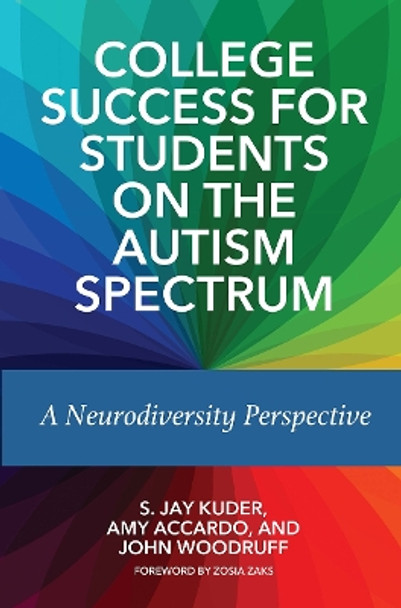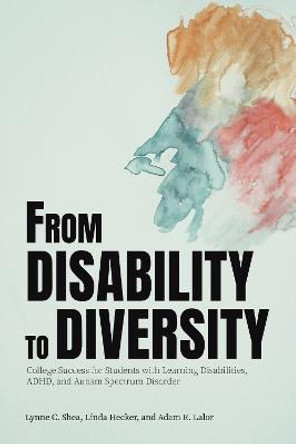Description
Helping both college faculty and student affairs staff enlarge their understanding of the experiences of students on the autism spectrum, this book provides guidance on putting supports in place to increase college success. Uniquely, the authors bring the perspective of neurodiversity to this work. Many individuals on the autism spectrum have been stigmatized by the diagnosis and experience autism as a negative label that brings with it marginalization and barriers through an emphasis on deficits. Autistic self-advocates within the neurodiversity movement are leading the charge to rethinking autism as neurodiversity, and to celebrating autism as central to identity. Neurodiversity is not a theory or a way of being, it is a fact, and neurological diversity should be valued and respected along with any other human variation such as race, ethnicity, gender, and sexuality.The book provides the practical guidance needed to help neurodivergent students succeed, with chapters that address a variety of key issues from the transition to college to career readiness after graduation. The authors address support services, faculty and staff roles, and enhancing academic success. They also cover navigating the social demands of college life, working with families, and mental health. The final chapter brings it all together, describing the elements of a comprehensive program to help this student population succeed.Difficulties with social interaction and communication are one of the defining characteristics of autism and often persist into adulthood. It can be assumed that difficulties with social interaction and communication may also impact college success, both socially and academically. But the answer for these students is not necessarily to try to "fix" these issues, since the fact that these students have been admitted to a degree-granting program shows that they can be successful students. Instead, there should be an emphasis on helping faculty, staff, and students understand the diversity of human behavior while helping autistic students achieve college success through a support system and by providing accommodations and services when needed.
About the Author
S. Jay Kuder is a professor in the Department of Interdisciplinary and Inclusive Education at Rowan University. Kuder's current research is focused on enhancing the success of college-age students with autism. Kuder is the author of a book entitled, Teaching Students With Language and Communication Disabilties that is in its fifth edition. Kuder holds a master's degree in special education from Temple University and a doctoral degree in applied psycholinguistics from Boston University. He is a member of the American Speech-Language-Hearing Association and the Council for Exceptional Children and is a fellow of the American Association on Intellectual Disabilities. Amy Accardo is an associate professor in the Interdisciplinary and Inclusive Education Department at Rowan University where she coordinates the PhD in education program. Accardo's scholarly activities focus on promoting equitable education opportunities for autistic young adults and working with neurodiverse students, faculty, and staff to implement inclusive pedagogy and practices on campus. She has published numerous articles and presented research nationally on autism and topics including college access, literacy, teacher preparation, and mental health. Accardo is founder of the AERA Autism Spectrum Research Committee. She holds a master's degree from Drexel University and a doctoral degree in special education from Arcadia University. John Woodruff is director of the Academic Success Center and Disability Resources at Rowan University, Glassboro, New Jersey. He coordinates campus services for students with disabilities and manages transitions for students entering college. John holds an MS in Health Education from St. Joseph's University and a BS in Business Administration from St. Francis University (Loretto, Pennsylvania). Woodruff is the coauthor of a book with Michelle Kowalsky entitled, Creating Inclusive Library Environments. His most recent activities include outreach to faculty a
Reviews
"For higher education practitioners seeking to serve autistic college students more inclusively on their campuses, this book clearly walks through considerations that should be on their minds and features countless resources that they can implement. Kuder, Accardo, and Woodruff also leave readers eager to explore an emergent base of research studies on autism in higher education."
Brett Ranon Nachman
Director of Research at College Autism Network; Postdoctoral Research Scholar at NC State University
"College Success for Students on the Autism Spectrum stands alone as the resource for the field of higher education when it comes to supporting autistic students. Until now, postsecondary educators and student affairs professionals were left without a comprehensive guidebook to understand and serve autistic students. Without question, this long-awaited text will equip those who work in colleges and universities to include, engage, and graduate students on the spectrum."
Edlyn Vallejo Pena
Professor of Higher Education Leadership and Director of the Autism and Communication Center
Book Information
ISBN 9781642670257
Author S. Jay Kuder
Format Paperback
Page Count 216
Imprint Stylus Publishing
Publisher Taylor & Francis Inc
Weight(grams) 294g








